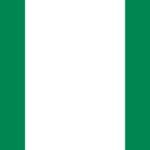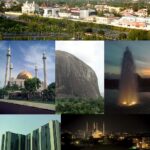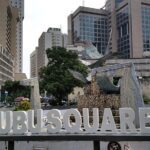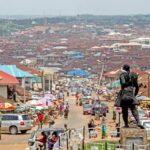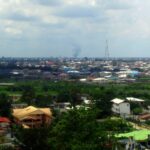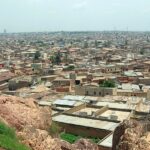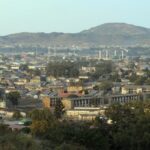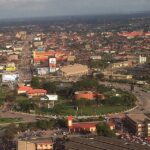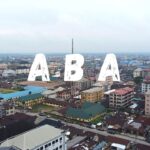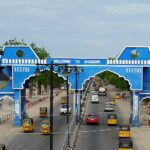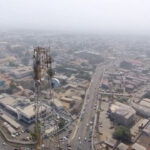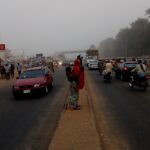Kaduna
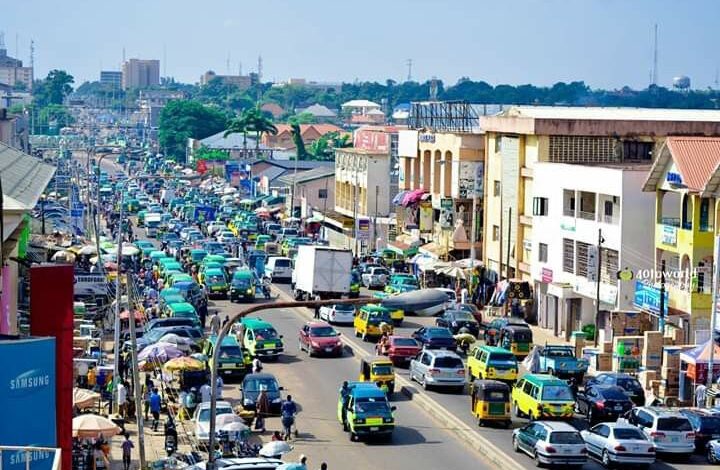
Kaduna, situated in north-central Nigeria, is the capital city of Kaduna state. It is positioned along the Kaduna River, a significant tributary of the Niger River.
In 1913, Sir Frederick (later Lord) Lugard, the inaugural British governor of Northern Nigeria, chose the current site along the Lagos-Kano Railway for the establishment of a town. Construction commenced, and by 1917, Kaduna, meaning “crocodiles” in Hausa, replaced Zungeru as the capital of the Northern Provinces, situated 100 miles (160 km) west-southwest. It also served as the capital of the Northern Region from 1954 to 1967. Lugard Hall, a legislative assembly building built in a simplified Islamic style, stands prominently at the head of the main street. The assassination of Sir Ahmadu Bello, the sardauna (sultan) of Sokoto and Northern premier, in Kaduna during an Igbo military coup in January 1966 played a pivotal role in triggering the Nigerian Civil War (1967–70).
Since the late 1950s, Kaduna has evolved into a significant industrial, commercial, and financial hub for the northern states of Nigeria. Most industries are concentrated south of the Kaduna River near the primary railway junction. The city hosts cotton-textile spinning and weaving mills, as well as the production of knit fabrics. The food industry manufactures beer, soft drinks, baked goods, and processed meat. Light manufacturing includes leather goods, plastics, ceramics, pharmaceuticals, furniture, and televisions. The city’s heavy industries produce steel and aluminium products, cement, asbestos cement, concrete blocks, electrical motors, ordnance, and explosives. Notable facilities include a steel-rolling plant, an automobile assembly factory, and an oil refinery supplied by a pipeline from the Niger Delta oil fields. A petrochemical plant commenced operations in the early 1980s. Kaduna is also a focal point for the construction industry and serves as a collection centre for various agricultural products, including cotton, peanuts (groundnuts), shea nuts, hides and skins, sorghum, millet, corn (maize), kola nuts, goats, poultry, and cattle.
Several educational institutions are based in Kaduna, including Kaduna Polytechnic College (1968), the Nigerian Defense Academy (1964), and Kaduna State University (2004). The city also hosts Christian teacher-training colleges. The Nigerian Geological Survey Agency has a research centre, along with a geology museum. The National Museum showcases exhibitions on the culture of the northern Nigerian states. Kaduna features a racecourse and the Ahmadu Bello Stadium (1964). Notable health institutions in the city include the Nigerian Institute for Trypanosomiasis (Sleeping Sickness) Research (1961) and the National Eye Centre.
Kaduna serves as a crucial transportation hub, with trunk railways from Lagos, Port Harcourt, and Zaria forming a junction in the southern part of the city. The Lagos-Kano highway also passes through Kaduna. The city is equipped with an airport located to the north. The estimated population was 1,375,000 in 2005 and approximately 1,685,000 in the urban agglomeration by 2016.
Map view
More about Kaduna from Wikipedia
| ID |
|---|
| 76966 |
| Name |
| Kaduna |
| State ID |
| 294 |
| State Code |
| KD |
| State Name |
| Kaduna |
| Country ID |
| 161 |
| Country Code |
| NG |
| Country Name |
| Nigeria |
| Latitude |
| 10.52641000 |
| Longitude |
| 7.43879000 |
| WikiData ID |
| Q208318 |
